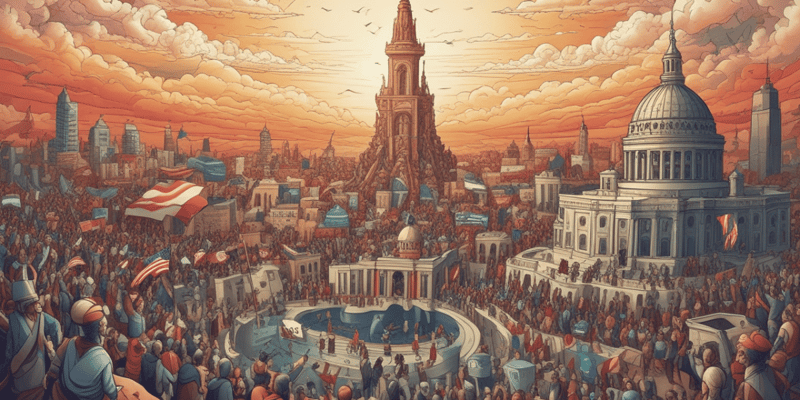10 Questions
किसकी आवश्यकता है कि प्रत्येक नागरिक को कानून के तहत समान सुरक्षा मिलनी चाहिए, चाहे वह लिंग, सामाजिक वर्ग, जाति आदि हो?
न्यायिक संरचना
सही प्रक्रिया के बिना किसके लिए कठिन हो सकता है समाज में विश्वसनीय संरचना बनाना?
मतदान अधिकार
लोकतंत्र में कौन-कौनसी प्रक्रिया होती हैं?
मतदान गणना
प्रति सप्ताह कौन-कौनसे कार्य होते हैं?
प्रस्तावित कानून
लोकतंत्र में नेतृत्व को पुनर्चुनायित करने में महत्वपूर्ण कौन-कौनसे पद हो सकते हैं?
प्रधानमंत्री
किस विशेषता की आवश्यकता है जिसे लोगों के बीच न्यायसंगत भागीदारी सुनिश्चित करने के लिए लोकतांत्रिक शासन में होती है?
समर्थन प्रक्रिया की स्वतंत्रता
लोकतांत्रिक प्रक्रियाओं में निर्णय लेने के लिए कौन समर्थ होता है?
सभी 18 वर्ष से अधिक उम्र के लोग
लोकतंत्र का मुख्य परिप्रेक्ष्य क्या होता है?
प्रमुख साधन
कौन-कौनसी वस्तुओं पर होती है महत्वपूर्ण पहलुओं की मुकाबला करने के लिए लोकतंत्रिक शासन?
रंग, जाति, मजहब
'सरकार के समर्थन में समुदाय' का महत्वपूर्ण पहलु है, क्योंकि:
'सहमति' की सुरक्षा करना
Study Notes
Politics of Democracy
Democracy is often considered the gold standard when it comes to political systems because it offers its citizens the ability to participate in decision making through voting and electing their leaders. While there may be variations across different countries, most democracies operate under similar principles. Here's what you need to know about how these principles work together to create functional democratic governments around the world.
Defining Democracy
Before we get into how democracies function, let's first define our terms. According to Merriam Webster, democracy can mean either:
- A government by all the people; especially rule by majority vote.
- Rule of the majority.
In essence, this means anyone aged over 18 is eligible to take part in democratic processes such as elections. These processes give power to the majority via votes cast during regular intervals like national elections or referendums. This system allows citizens to actively choose who represents them in public office rather than having someone imposed upon them from above. It values equality of opportunity, universality of freedoms irrespective of race, colour, religion, linguistic group or any other status, empowerment of the individual, and the transformation of potential into performance through purposeful action.
Key Elements of Democratic Governance
At its core, democratic governance requires key elements to ensure fair participation among its population:
-
Freedom: Citizens must enjoy freedom of speech, assembly, association, and movement, which includes free access to information, media, and ideas.
-
Legal Framework: Every citizen needs equal protection under law regardless of gender, social class, ethnicity, etc., with due process guarantees providing transparency and accountability in legal proceedings.
-
Elections & Voting Rights: Regular, genuine, honest, and fair multiparty elections with viable opposition parties and full suffrage rights granted to every adult member of society.
These three components are essential in creating reliable structures where citizens can trust the legitimacy of election outcomes both domestically and internationally. When these conditions aren't met, it becomes difficult for true representative democracy to flourish, potentially resulting in authoritarian regimes.
How Democracy Works
The exact mechanics of a democratic state vary depending on factors specific to each country—from federal parliamentary systems to presidential direct democracies. However, some general steps typically occur within most democratic societies:
-
Campaigning: Candidates stand for various positions including mayor, councilor, MP, MEP, president, prime minister, governor, senator, etc. They campaign extensively to win popular support before elections.
-
Vote Counting: Once candidates have been elected or reelected (if they serve a fixed term), legislatures meet regularly to discuss proposed laws, resolutions, treaties, and diplomatic agreements.
-
Lawmaking Process: Bills passed by Congress become laws only after being signed by either the President or one of his officials acting in accordance with Executive Orders or Resolutions adopted by the Senate and House of Representatives.
One important aspect of democracy is the right of petition and redress of grievances, enabling individuals to address complaints directly to their local, state or central representatives without fear of retaliation. Additionally, civil libertarianism (which emphasizes protecting personal freedoms) and civic republicanism (emphasizing active engagement in politics) play integral roles in sustaining healthy functioning democracies.
Challenges Facing Modern Democracies
Despite their successes in promoting human rights, prosperity and security, modern democracies face numerous challenges, such as economic inequality, climate change, immigration, and cybersecurity threats. Political polarization has also intensified in recent years, causing concern about whether traditional political institutions will remain effective enough to manage these issues effectively. Moreover, while many nations claim to use democratic systems, in practice they fall short of fulfilling several criteria necessary for true representation. For example, rigged elections occur frequently worldwide, undermining the concept of fair representation through choice.
Conclusion
Democracy remains a vital tool for advancing global peace, stability and societal progress despite facing contemporary difficulties. Its success relies heavily on its ability to adapt to changing circumstances while maintaining adherence to fundamental principles such as inclusivity and respect for individual dignity. As long as states uphold these ideals, they could stand firm against forces trying to erode them.
Explore the key elements of democratic governance, the mechanics of how democracy works, and the challenges facing modern democracies in this informative quiz. Learn about the essential components that ensure fair participation among citizens and the steps involved in elections and lawmaking processes.
Make Your Own Quizzes and Flashcards
Convert your notes into interactive study material.




